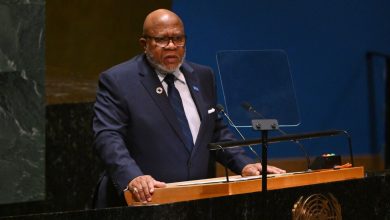Along Mexico’s Riviera Maya, Tourists, Drugs and Violence

The headlines out of Mexico have been jarring. Two women were killed in the crossfire when rival gangs started shooting at a popular sidewalk restaurant in Tulum. Gunmen battled on a beach near Puerto Morelos as tourists scrambled into a Hyatt hotel for cover. A killer-for-hire bought a day pass to an all-inclusive resort in Playa del Carmen to carry out a hit in a poolside snack bar.
But the spate of violent incidents along the country’s Riviera Maya, the strand of Caribbean beaches stretching 80 miles south of Cancún to the Mayan ruins of Tulum, over the past few months hasn’t seemed to scare off the vacationers who arrived by the millions last year to spend a pandemic holiday on the beach, dive the coral reefs or dance in boho bars.
“It’s all like drug-related violence so it doesn’t affect us,” said Elizabeth Sedgemore, 50, of Seattle, who was walking in Puerto Morelos one recent noon looking for a restaurant with her husband, Gregory, 59. He added: “We just don’t put ourselves in situations where we’re going to be in trouble. We don’t do drugs, we don’t deal drugs, we don’t stay out late — so we feel very safe.”
The region, part of the state of Quintana Roo, quickly reopened after the first few months of the pandemic, as Mexico welcomed foreign tourists while much of the world stayed closed. The country imposed not a single restriction on entry by air — travelers, vaccinated or unvaccinated, could come in without testing for the coronavirus and faced no quarantines. Within Mexico, shutdowns varied according to state and even within Quintana Roo as the pandemic progressed, with limits on occupancy in hotels and restaurants and widespread use of masks indoors.
Tourists often seemed to take the rules more lightly than most Mexicans, who were hit hard by the pandemic. Mexico has confirmed more than 315,000 deaths from Covid-19 but experts believe the toll is much higher. Government figures show that during the pandemic, excess mortality, or the number of deaths above what would have expected under “normal” conditions, has climbed above 667,000.
But as other resort areas enforced restrictions, Tulum, which markets its hippy chic spirituality, continued to party, and in November 2020, it hosted a five-day festival that became a coronavirus superspreader event.
Now that tourists have returned in full force to all of the Riviera Maya, its long-festering problems are coming into focus. Alongside the glitz of the region’s all-inclusive resorts, authorities and business groups say, are boomtowns where entrenched criminal gangs operate openly to sell drugs and extort local businesses.
“Unfortunately people come to consume drugs and alcohol,” said Óscar Montes de Oca, the prosecutor for the state of Quintana Roo. “They come to do things they wouldn’t do at home. This demand creates a supply and that generates all the conflict.”
The warning signs have been flashing for several years, particularly in the region’s largest town, Playa del Carmen, where an attack on an international music festival in 2017 killed five people. In 2019, gunmen opened fire in a local working-class bar, killing seven men.
What is new is how openly the gangs have taken their battles to the heart of tourist zones.
The recent spate began in Tulum on Oct. 20, when the leader of a gang darted into La Malquerida restaurant to escape an attack from rivals, who instead accidentally killed a woman from Germany and an Indian-born woman who lived in California. Three other European tourists were injured.
Some two weeks later, on Nov. 4, two gangs engaged in a shootout on a beach near Puerto Morelos called Bahía Petempich, as tourists at the Hyatt Ziva Riviera Cancún hotel fled into the lobby, where crouching staff ushered them up the stairs into safe rooms. Two of the gunmen were killed and a tourist from Utah was injured.
“What makes it shocking is that you feel safe at these all-inclusive resorts,” said Mike Sington, a retired entertainment executive from Los Angeles who was staying at the Hyatt and posted video of the hotel guests in hiding. “They’re all walled off and secured off,” he said.
At the Hotel Xcaret in Playa del Carmen on Jan. 21, a gunman managed to gain entry to the hotel grounds where, authorities say, he shot and killed two Canadian men and injured the wife of one of them. The murder victims had ties to organized crime in Canada, Mr. Montes de Oca said, adding that they were killed over a debt related to arms and drug trafficking. A man accused of scouting the complex for several days before the hit and driving the getaway car, as well as a Canadian woman who was seen speaking to the hit man before the shooting, are both under arrest.
Those killings were followed by the murder of the Argentine manager of a beach club in Playa del Carmen on Jan. 25. Authorities say that he was killed by members of a gang that had planned a giant party at the club. When municipal authorities blocked the event, the gang took revenge on the club.
And the violence has continued. On Feb. 19, rival drug dealers opened fire at Art Beach Tulum, a restaurant on the outskirts of Tulum where an order of sea bass with asparagus risotto and seaweed cream goes for $35. Two of the dealers were killed.
That event highlighted how Tulum in particular has become a center for drug consumption in the Riviera Maya. Ten gangs have carved up sales in the area, Mr. Montes de Oca said, and when they encroach on each other’s territory, what “begins as a minor crime, selling drugs, ends in tragedy.”

52 Places for a Changed World
The 2022 list highlights places around the globe where travelers can be part of the solution.
Reaction to a clampdown
Local authorities say that the latest round of violence is a reaction to the state’s efforts to clamp down on crime, after law enforcement was ignored under previous state governments. Police have moved cartels off the beaches and main streets where dealers sell souvenirs or offer massages as cover. Investigations of gangs that sell drugs in restaurants and bars have led to the arrest of hundreds of gang leaders, said Lucio Hernández Gutiérrez, the secretary of public security for Quintana Roo.
The groups “want to continue their hold on these spaces that give them exorbitant profits,” he said.
With investment in police training and technology, statewide rates for homicide and most violent crimes have fallen over the past three years, Mr. Montes de Oca said, but he acknowledged that the recent violence had created a problem for the state. “These events occur in iconic places that are very vulnerable in terms of media and this affects the perception of safety in the state a lot,” he said.
More than 6.6 million foreign tourists flew to Cancún and the Riviera Maya last year, according to the Mexican tourism ministry, with more arriving on cruise ships or domestic Mexican flights, and all of them except a handful enjoyed a peaceful holiday. It is Mexicans who overwhelmingly suffer the weight of the violence and it crosses all classes, as it has across much of the country. Construction workers on a luxury hotel site were extorted and co-opted by drug cartels. A candidate for mayor of Puerto Morelos was shot and killed in a restaurant. Taxi drivers in Tulum are killed in their cars and restaurant owners say that extortionists leave them handwritten messages accompanied by a warning bullet.
Since the outbreak of violence in tourist areas, Quintana Roo law enforcement officials have moved quickly to announce arrests in each case. In December, an additional contingent of about 1,500 members of Mexico’s National Guard began patrolling the beaches in a sign of how seriously the federal government has taken the threat to Mexico’s tourist industry.
But many question how sustainable that approach is. “For me, it’s just a facade,” said Fabiola Cortés, a lawyer and journalist who helped expose the dealings of Quintana Roo’s previous governor. He is now in jail, facing trial on corruption charges. “When high-impact events take place, they just detain anybody.”
David Ortiz Mena, the president of Tulum’s hotel association, said that Tulum’s rapid growth over the past few years had been uncontrolled, with no thought given to the effect of throwing jungle parties for 5,000 people. He acknowledged that the authorities had begun to make some progress, but added, “The fact that the police can’t grow along with the population is also a problem of sustainability,.
Growing tourist numbers
For now, it seems that most tourists who have heard of the killings seem willing to weigh the risks and make the trip to the Riviera Maya.
In December, when four out of five members of Pam Singh’s family had Covid-19, she decided that “we have to get something great out of this” and booked a holiday to take advantage of the family’s post-illness immunity.
Ms. Singh, 47, who lives in Brooklyn, had already traveled to Puerto Vallarta, on Mexico’s Pacific Coast, and was looking for a destination that was easy to reach. “The scenery is beautiful, the hospitality is warm and the food is delicious,” she said. “It’s hard to argue with everything that Mexico has to offer.”
Researching reviews online, she settled on a week at an all-inclusive resort in Puerto Morelos, which promised activities for her three children, age 8 to 15, and good food.
She also saw the news of violence. “I didn’t find it especially alarming,” she said by phone from her hotel, noting that the resort was in a self-contained area. “I understand that it was out of ordinary for the region.”
But Ms. Singh, an international human rights lawyer, and her husband, Jeff Locke, 49, a teacher, may have a higher risk threshold than tourists coming from a placid rural area, she said. “We live in New York City and it’s not that crime isn’t increasing. You learn to live with it and take precautions. A vacation isn’t different.”
That seems to be the attitude many tourists are taking. Almost none of the recent inquiries to Del Sol Travels, which plans destination weddings in the Riviera Maya, have dealt with security, said Matt Adcock, the company’s owner.
“Do these people have concerns? I think they do,” said Mr. Adcock, an Atlanta native who has lived in Playa del Carmen since 2007. He thinks people have gotten numb during the pandemic. “I believe that they are weighing the risk to the reward and making the decision.”
The company has booked six weddings this year through April and is handling inquiries for 2023.
Missy Skoog, a travel adviser for Travel Leaders in Minneapolis said the overwhelming concern she hears from vacationers thinking of going to the Riviera Maya is the risk of getting stuck in Mexico because they test positive for the coronavirus before their flight back to the United States.
Ms. Skoog said the recent events are isolated incidents. If she felt the region, which she visits three or four times a year, weren’t safe, she wouldn’t send people to the Riviera Maya, which is one of her top-selling regions this year. “We have gained violence here,” Ms. Skoog said, referring to Minneapolis. “They have gained violence there.”
Not all tourists are convinced. Atul Tiwary, 27, a trader in the financial services industry in New York who has traveled several times to the Riviera Maya in the past, was planning to return in March with three friends. “One person proposed the idea of reconsidering because of this thing popping up and everyone agreed.” The group switched its destination to Cabo San Lucas.
“I’d say I’m a pretty adventurous traveler in terms of far-flung cultures,” he said. “What concerns me is violent crime that is pretty visible as a tourist.”
At the time of the shooting at the Hyatt Ziva Riviera Cancún, Vacaya, an L.G.B.T.Q. travel agency, had a group of about 700 guests at the hotel, including Mr. Sington. It was the third annual trip that Vacaya had booked to the Riviera Maya. This coming year in November, it will go to Puerto Vallarta instead, but the company had decided to change before the shooting incident, for variety. “We have not abandoned Riviera Maya,” wrote Vacaya’s co-founder Patrick Gunn in an email. “But we’ll consider the overall climate and improvements made by local authorities before heading back.”
Fear of gangs
Some local restaurants see drug sales as “a necessary evil,” said a restaurant owner with knowledge of the problem, who asked not to be identified by name because of fear of violent reprisal. Cartels arrive and force the restaurant to place a dealer inside the restaurant or at the entrance, he said. Owners don’t go to the authorities because they fear that corruption in the police means their complaint will get back to the gangs.
“There is always an option,” said James Tobin, a Cancún real estate agent and anti-crime activist who now serves on the federal government’s National Public Safety Council. “The option is to report or close down.”
“If all citizens believe that the police are corrupt, then the only ones who gain are organized crime,” he added.
Other business leaders agree that the government has shown willingness to attack crime and point to the arrests made after each incident, as well as broader investigations to determine the leaders of the gangs who carried out the shootings. “It’s not an overnight job,” said Iván Ferrat Mancera, the president of the Business Coordinating Council of the Caribbean, the region’s main alliance of business groups and nonprofit organizations. “If you confront them, there will be deaths.”
None of that seemed to be a worry for Angelica and Vincent Shields of New York, who are in their 70s and have been coming to Puerto Morelos for 20 years. “We got our vaccine and we got on the plane,” Mr. Shields said.
“We come here for a month and we feel safe,” said Ms. Shields, who said she was reassured by the presence of the National Guard. “Back home in New York, I see them as well.”
“I would just like to say, Viva Mexico, the people are great and the food is fantastic.” Not to mention, she added, the margaritas.
Alejandro Castro contributed reporting from the Riviera Maya.
Follow New York Times Travel on Instagram, Twitter and Facebook. And sign up for our weekly Travel Dispatch newsletter to receive expert tips on traveling smarter and inspiration for your next vacation. Dreaming up a future getaway or just armchair traveling? Check out our 52 Places for a Changed World for 2022.





